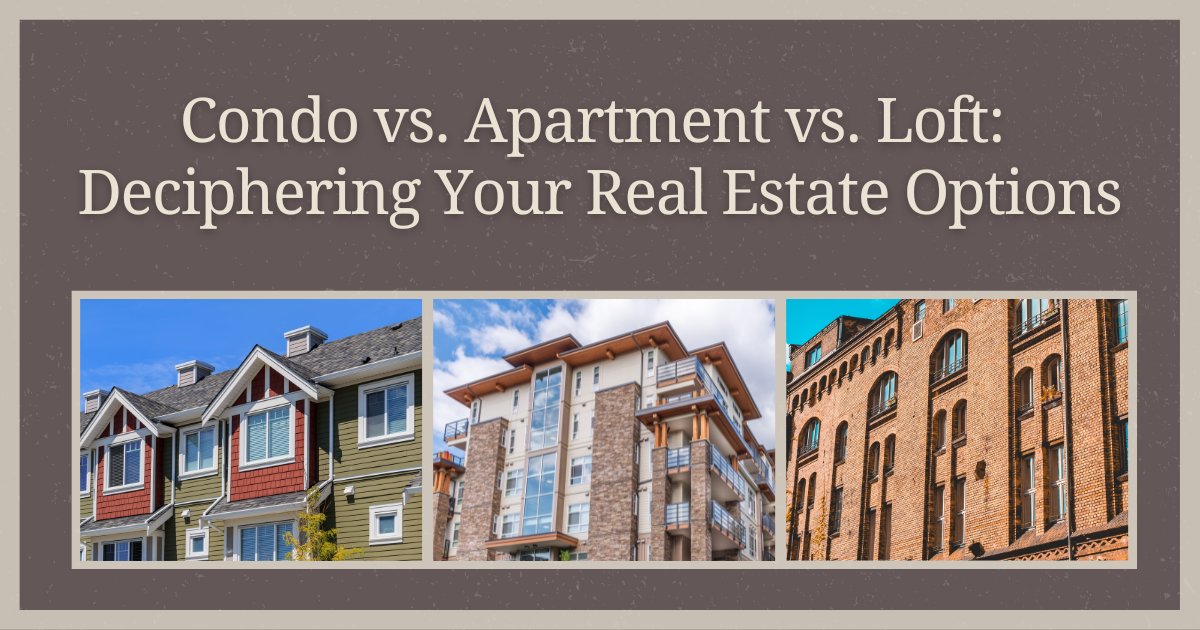Lofts, Condos & Apartments: Key Differences Buyers Need to Know
Posted by EdmontonRealEstate .ca on Tuesday, September 12th, 2023 at 8:59am.

When diving into the real estate market, it's essential to understand the different types of properties available. Condominiums, lofts, and apartments are three popular property styles with a lot of similarities, but not everyone knows the nuances that differentiate them. Each property type offers distinct characteristics, benefits, and drawbacks. Recognizing the differences can provide clarity and direction, enabling buyers, renters, and investors to make informed real estate decisions that align with their needs and financial goals.
What Is a Condo?
A condo, short for condominium, is a single unit within a larger community. These individual units can exist in various forms, such as high-rise buildings, multi-family homes, or even fully detached properties. Purchasing a condo means owning your specific unit while holding a shared interest in the larger community's common spaces. These shared areas, referred to as common elements, may include amenities like swimming pools, gardens, and gyms.
The condo community is typically governed by a board, which can be appointed by a communal vote. The board oversees maintenance, sets budgets, and charges the condo owners the necessary fees for upkeep and improvements.
There are many reasons why someone might choose to buy a condo over a single-family home. Often, condos are located in urban centers or popular areas, offering residents proximity to workplaces, entertainment, dining, and cultural amenities. Additionally, condos usually come with fewer maintenance responsibilities since the condominium association takes care of common areas and amenities. This makes them particularly attractive to those who prefer a lock-and-go lifestyle.
Types of Condos
- Freehold Condo: A type of condominium where the owner not only possesses the individual unit but also owns the land upon which the building is situated.
- Timeshare Condo: A condo ownership model where multiple individuals share ownership, and each owner is allotted a specific period during which they can use the property.
- Penthouse Condo: Located on the top floor of a building, these condos typically offer expansive views, more significant square footage, and luxurious amenities, setting them apart from other units in the same structure.
What Is an Apartment?

An apartment is a rental unit, and the rentability is the primary difference when comparing condos and apartments. They are in various configurations, from studio apartments to sprawling penthouse suites. While apartments often exist in the same physical structures as condos, the key distinction lies in ownership.
An apartment tenant doesn't own the unit. Instead, they pay rent to a property owner, who assumes responsibility for maintenance and upkeep. According to Alberta law, there are a few health and safety criteria for landlords that must be satisfied in order to rent out a given space as an apartment.
While most experts agree that owning real estate is one of the best investments, buying real estate when the timing isn't right can cause more problems than it solves. By renting an affordable apartment, you can save up for a down payment on your dream home, simplify your life during periods of transition, and enjoy a convenient lifestyle without worrying about funding most maintenance and repairs. It's not advisable to rent forever, but it can set you up for success when buying real estate down the line.
How to Invest in Apartments
Though the term "buying an apartment" is often thrown around, it's a misnomer. One cannot buy an apartment in the traditional sense. However, individuals interested in buying an investment property can purchase a condo and rent it out, thus turning it into an apartment.
Another smart strategy, especially for new investors, is "house hacking," where homeowners convert a portion of their single-family residence into an apartment to generate rental income.
What Is a Loft?
The term "loft" describes a style rather than an ownership structure. A loft can be categorized as a condo or an apartment. These units are characterized by their origins—often refurbished spaces within old industrial buildings. This gives them a distinctive look with towering ceilings, expansive windows, minimal interior walls, and vast open floor plans. The popularity of this style has surged, leading to modern constructions adopting the industrial-chic aesthetics of traditional lofts.
Living in a loft offers a unique blend of aesthetics and functionality that appeals to many urban dwellers. Lofts' design characteristics introduce an abundance of natural light, creating a feeling of spaciousness and fostering a modern, airy ambiance. This open concept allows residents to flexibly design and customize their living space to their taste. Originally converted from industrial spaces, lofts often retain authentic elements like exposed brick walls, wooden beams, and metal fixtures, offering a raw yet chic industrial charm. Their typically central locations in cities further provide easy access to local amenities, culture, and nightlife, making loft living a vibrant and stylish choice for those seeking an upbeat lifestyle.
What Is a Co-Op?
A housing co-op, or co-operative, presents a unique blend of property ownership and renting. It's a housing development where members purchase a share to gain housing access, which could be in the form of apartments, townhomes, or even houses.
The primary objective of co-ops is to offer housing at break-even costs, with no profit motives. Members of the co-op co-own the establishment and pay a monthly housing charge for their specific unit. However, unlike traditional home ownership, there's no down payment, and they can't sell their individual unit if they decide to move.
Condo, Loft, or Apartment: Where Do You Want to Live?
Navigating the real estate landscape can be challenging without a clear understanding of property types. Recognizing the distinct attributes of condos, apartments, lofts, and co-ops can streamline decision-making, providing clarity and confidence. This knowledge is invaluable, whether you're embarking on your home-buying journey or exploring types of real estate investment. Armed with this information, you're better equipped to make choices that reflect your aspirations, needs, and financial objectives.

